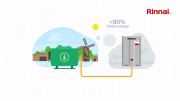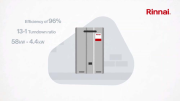Additionally, a new Labour government must provide a policy framework that supports a range of cost-effective low carbon fuels capable of efficient performance and carbon reduction. The government must also focus on an open and transparent collaborative approach with all facets of the power and energy industry so that all nuanced building envelopes can transition towards a low carbon future.
The new Labour government should be legislating for UK customers to have flexible energy options that reflect the practical, economic, and technical reasoning needed to design and install decarbonising technology for all residential and commercial carbon reduction. Previously, despite electioneering statements by the then Govt, UK policy struggled to address the practical, economic, and technical feasibility nuances of the UK building stock and instead touted a heat pump only approach.
Now that a new government is in place an adapted national policy that affects both off and on-grid customers should focus on supplying UK customers with practical, technical, and economic solutions to every individual site.
 Additionally, a new Labour government must provide a policy framework that supports a range of cost-effective low carbon fuels capable of efficient performance and carbon reduction. The government must also focus on an open and transparent collaborative approach with all facets of the power and energy industry so that all nuanced building envelopes can transition towards a low carbon future.
Additionally, a new Labour government must provide a policy framework that supports a range of cost-effective low carbon fuels capable of efficient performance and carbon reduction. The government must also focus on an open and transparent collaborative approach with all facets of the power and energy industry so that all nuanced building envelopes can transition towards a low carbon future.
One way in which a new Labour government will be measured in terms of performance and commitment within UK energy is the direction of off-grid fuels and appliances.
There are approximately 1.65 million non-domestic buildings in England and Wales according to the last official report a few years ago. Non-domestic buildings are defined as buildings which are not used as homes. Therefore, these buildings are diverse in size and structure and include commercial and public premises. Half (48%) of the NDCs surveyed used a form of electric heating on their premises whilst 30% had an oil boiler and 12% had an LPG boiler.
Of these approximately 280,000 are in areas not connected to the gas grid, and many of these use either oil, liquified petroleum gas (LPG), or coal powered heating systems to heat their buildings. The phasing out of fossil fuel installations in non-domestic buildings will therefore require a significant increase in the deployment of low carbon heating solutions, such as hybrid heating & hot water systems.
On the residential part of this sector there are an estimated 4.4 million households across the UK not connected to the gas grid in 2021, accounting for 15.1% of domestic properties, a sizable proportion of UK housing stock. Heat pumps are a viable carbon reducing technology capable of covering a sizable percentage of UK decarbonisation targets but are unlikely to satisfy rural customers due to a lack of insulation and other technical issues in older off-grid properties.
Rather than replacing a boiler or commercial water heating system and purchasing a heat pump, there are alternative ways to provide heat and hot water to off-grid properties. Drop in solutions such as BioLPG and future fuels such as r-DME mean that boilers and water heaters do not have to be replaced. Gaseous systems that accept fossil fuels are also capable of receiving biofuels as legitimate energies.
Future capacity of r-DME and other alternative biofuels are set to rise sharply in an approaching period further increasing the likelihood of this fuel being introduced nationally at some stage soon.
Off-grid UK residents are in an identical position to all other owners of residential and commercial properties in a requirement to decarbonise. As with all other domiciles and business premises that are off grid the UK government needs to implement a nationwide plan that is designed to ensure the quickest and cleanest route towards carbon reduction.
 Current proposals insist all fossil fuel and LPG domestic boilers and commercial water heaters that provide heat and hot water to off-grid domiciles and commercial properties will be banned from 2035. In replacement of traditional boilers, the new UK government, instead, suggests that a heat pump is the preferred method of clean energy off-grid heating and hot water. This policy approach unfortunately does little to address those hard to abate properties that are seemingly left with no technical, practical or economically feasible solution. There have been huge investments, on a global scale, of billions of dollars and euros in synthetic and alternative fuels for off-grid.
Current proposals insist all fossil fuel and LPG domestic boilers and commercial water heaters that provide heat and hot water to off-grid domiciles and commercial properties will be banned from 2035. In replacement of traditional boilers, the new UK government, instead, suggests that a heat pump is the preferred method of clean energy off-grid heating and hot water. This policy approach unfortunately does little to address those hard to abate properties that are seemingly left with no technical, practical or economically feasible solution. There have been huge investments, on a global scale, of billions of dollars and euros in synthetic and alternative fuels for off-grid.
For example, Dimeta – a collaborative effort by two of the world’s leading LPG (Liquefied Petroleum Gas) distributors, SHV Energy and UGI International – is constructing a £150 million renewable & recycled carbon DME production plant in Teesside, northeast UK. Once operational the plant will produce over 50,000 tonnes of DME from non-recyclable waste – the equivalent of 25% of LPG domestic heating in the UK.
In addition to the first plant in the UK, subsequent plants are in development in Europe and the United States, as part of Dimeta’s goal to achieve 300,000 tonnes of DME production capacity by 2027.
American gas and electric company UGI and Dutch global LGP and LNG distributor SHV Energy said last year that they plan to construct up to six plants over the next five years with a total production capacity of 300,000 t of r-DME. Total investment could reach $1 billion if r-DME production facilities are constructed across Europe and America.
Rinnai and Dimeta are working together to design and produce off-grid energy and hot water supplies to properties not connected to the UK national grid. Rinnai is sensitive to both national and global shifts in customer and energy market requirements.
Rinnai and Dimeta have also signed a MOU (Memorandum of Understanding). Both companies will work together to explore blending DME with LPG and used in existing appliances. Dimeta and Rinnai will also aim to develop 100% DME dedicated appliances, including hot water production systems, boilers and dryers.
Rinnai aims to supply all UK customers with updated information pertaining to all energy matters that may affect future domestic and commercial decarbonising options.
To find out more about the changing face of future fuels sign up to the Rinnai pathways newsletter https://www.rinnai-uk.co.uk/contact-us/newsletter-sign